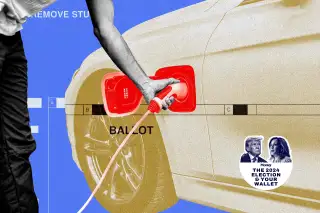The Surprising Reason EV Sales Could Spike if Trump Wins

Since the beginning of last year, many Americans who buy or lease electric vehicles have been eligible for a tax credit of up to $7,500 (or $4,000 for used EVs). But it seems the credit will be in jeopardy if former President Donald Trump is re-elected.
In that scenario, automotive analysts say they expect a short-term surge in EV demand until the inauguration, potentially driving up transaction prices through late January. Because the tax credit significantly lowers the cost of EVs, shoppers interested in these vehicles would likely want to take advantage of the government incentives while they can.
After that, however, the EV movement could lose steam if Trump is able to restrict or undo the tax credit, which was expanded during President Joe Biden’s administration.
Democrats say government incentives like the EV tax credit can accelerate the transition to more sustainable vehicles, which would help achieve critical environmental goals. But Trump argues EVs are too expensive, and he says they can’t travel far enough to support widespread adoption. He’s also broadly skeptical of the idea that human activity is causing climate change; he scaled back dozens of environmental policies during his term.
In just about every campaign speech recently, Trump has attacked Democrats' pro-EV positions while promising to end what he calls "mandates" for electric vehicles, referring to emissions standards that would require over half of new cars sold in the U.S. to be EVs by 2032. (Experts say these standards fall well short of being a "mandate," and Vice President Kamala Harris has been reassuring voters that she "will never tell you what kind of car you have to drive.")
What could happen to the EV tax credit if Trump wins
Trump has been less vocal about his stance on the $7,500 EV tax credit, which was created by the Inflation Reduction Act of 2022.
In an interview with Reuters, Trump commented on the EV credit, saying, "Tax credits and tax incentives are not generally a very good thing." However, he added he was not "making any final decisions on it."
To fully eliminate the EV tax credit, Trump would likely need majorities in Congress, which controls the nation's purse strings, to support repealing part of the Inflation Reduction Act.
However, if Trump wins, his administration could take action to restrict access to the tax credit without going through Congress. That's because the Department of the Treasury and the Internal Revenue Service (IRS) play key roles in determining which vehicles qualify and how the tax credit is distributed.
Some have speculated that Trump's recent alignment with Tesla CEO Elon Musk could bode well for the EV movement, given that Tesla has pioneered electric vehicle development. However, Musk has suggested he would support ending the tax credit: "Take away the subsidies. It will only help Tesla," he wrote in a July post on X.
Republican vice-presidential nominee JD Vance's views on the tax credit are more clear than Trump’s, as he introduced a bill in the Senate in September 2023 that would have repealed the tax credit for EVs and instead given incentives to folks who purchase American-made cars powered by gas or diesel. The bill was referred to a committee and has not advanced.
Why EV sales could immediately surge
Jonathan Smoke, Cox Automotive's chief economist, predicted back in June that a meaningful number of EV shoppers will move up the timeline of their purchase if Trump wins.
"There will be broad consumer expectation that those tax credits, which we are definitely seeing are helping to move what is being sold, could be going away," he said during a presentation. "Historically, whenever major government incentives are reaching an expiration date — or a perceived expiration — there's often pull-ahead demand that appears in the market."
The tax credit (and its potential expiration) isn't the only reason it's a good time to shop for an EV right now, Jessica Caldwell, head of insights at Edmunds, tells Money.
Overestimating demand, automakers produced too many EVs too quickly the past few years, and car companies and dealerships have since been forced to reduce prices and increase incentives to try to offload some of these cars. This imbalance won't last forever — automakers have already scaled back production — but Caldwell expects that the deals will remain strong for at least the next six months or so.
Leasing an EV is currently the most popular option, partly due to a loophole in the tax credit that allows EV leasers to take advantage of the $7,500 even if their income otherwise exceeds the limits to qualify. Plus, a wider range of vehicles qualify for the tax credit with leasing because requirements related to where the vehicle and its battery were produced do not apply. Edmunds data shows that 78% of EVs bought at dealerships are being leased.
"If the tax credit did go away, that would really affect those sales," Caldwell says. "When people do the math — you look at the EV leases and then the $7,500 tax credit is applied to those and that makes the monthly payments really cheap … it's like you'd be buying a compact Nissan Versa compared to a nice EV with the same lease payment."
Should Trump remove the tax credit, Caldwell says there would be "an immediate impact" on EV sales and automakers would have to come up with new ways to stimulate demand, which would likely include lowering prices even more. That would be a serious problem for the industry, as most automakers aside from Tesla are already losing money on every EV they sell.
More from Money:
The Newest Amazon Prime Perk? Cheaper Gas
Elon Musk and Donald Trump Have Been Giving Voters Money. Is That Legal?